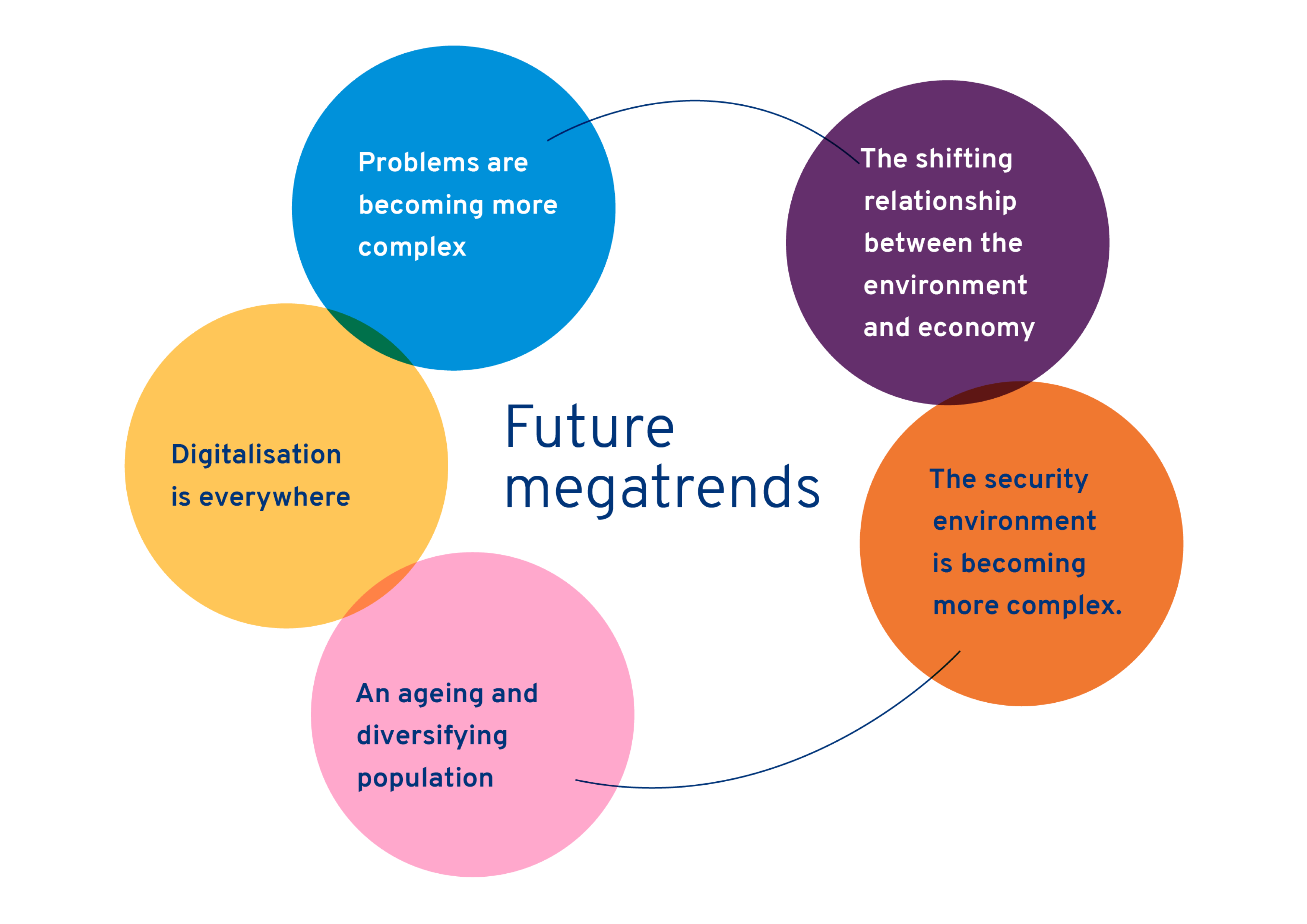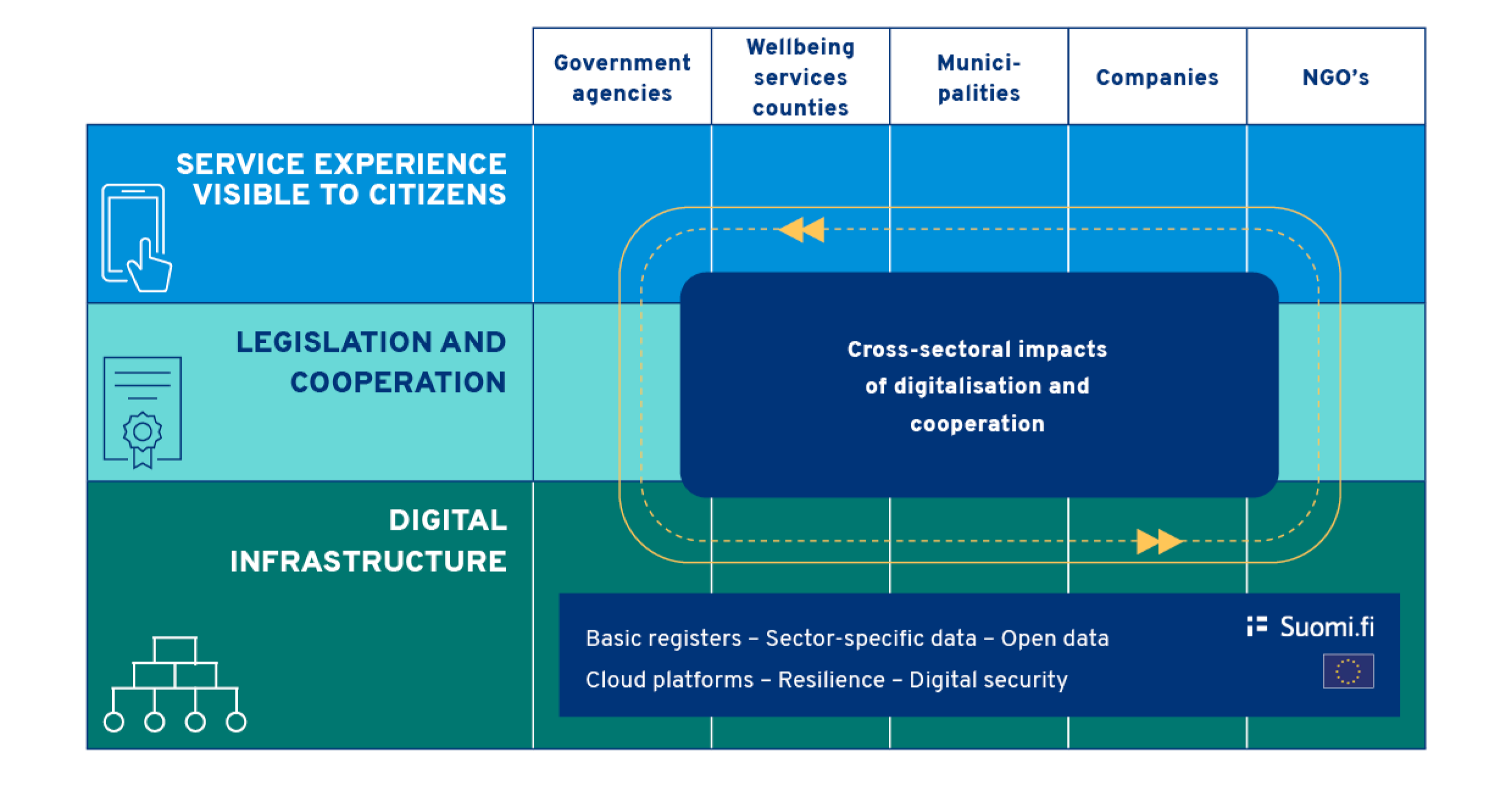Digihumaus-report 2023:
Solutions for smoothly functioning Finland

Introduction: Trust - A key asset for the future
In 2020, we published the Digihumaus report, which laid out five intertwined megatrends that are shaping our future. Following the successive crises of recent years, the time has come to revise these trends to reflect current developments. The interactions between them are also changing. As one trend is highlighted, another may fade into the background. For example, the deteriorating security situation in Europe may distract attention from climate change and make energy more a question of security of supply than environmental action.
Finland and Europe are ageing and becoming more diverse, climate change and biodiversity loss are changing all living environments, and unprecedentedly rapid technological development and digitalisation are transforming well-established ways of doing things. Both the transition to a low-carbon society – referred to as the green digital transition – and the management of digitalisation are accelerating the entire European innovation environment. At the same time, we have faced in recent years an international pandemic and the outbreak of war in Europe, and we have witnessed the fragmentation of the ideals of globalisation and the struggle between democracy and autocracy. There is no sight at the moment of any return to the old habits and the safe, familiar normal. The diverse and challenging questions about responsibility and how to build an ecologically, socially and economically sustainable future relate to all kinds of systems and societies, as well as to digitalisation as a whole.
In the 2022 Digihumaus report, we presented four scenarios for the future of digitalisation, positioning them along the axes of trust and cooperation. As we have seen, global developments are leading us in opposite directions from one another. That is why it matters who gets to speak when we talk about the future. Through our building of digital public services, we may here in Finland be on the way to a world of deeper and better cooperation, but we still have plenty of room for improvement in maintaining trust, eradicating inequalities, improving inclusion and strengthening people’s sense of security. We must build vigorously in order to make a digitalised society based on trust and equality a winning asset in the global competition between democratic, oligarchic and authoritarian regimes.
Through the five megatrends presented in this Digihumaus report, we examine from the perspective of the Digital and Population Data Services Agency the key drivers of change that are impacting us all. We also present four development proposals for the coming years in relation to the agency’s field of activity. If implemented, they would promote the lifestyle-centric goals of the Finnish Digital Compass, improve the customer experience visible to citizens, and make full use of our digital infrastructure. During turbulent times, we must pause to examine our shared situation and to identify every meaningful role in our interconnected, complex society. This will enable us to renew, adapt, and make the rest of this decade our own.

PICTURE: Five future megatrends
01 Problems are becoming more complex
The complex problems we face are painfully difficult to solve. Problems related to areas such as digitalisation, the diversifying population and climate change can only be solved through systemic, network-based cooperation and management. As complexity increases, so does the need for flexibility and forecasting.
We are living with a new ‘normal’ of continuous crisis, where states of emergency are successive and overlapping and crises are interlinked. This creates a danger that public administration activities will become mostly a matter of continuous responses to new crises, leaving little time and resources for self-initiated reforms. In such a situation of ongoing crisis, it is even more important to form as diverse as possible an overall picture of the current situation. This is possible when different actors contribute their own perspective towards this overall picture. In a complex world of ongoing uncertainties, public administration can create space to act only through network-based cooperation between authorities and other actors, detailed precautionary measures, and foresight work.
02 Digitalisation is everywhere
In an increasingly digital everyday life, change must be based on sustainable values. Even in the midst of rapid technological development, it must be ensured that everyone can interact in a humane and safe manner.
The speed of digital development is challenging familiar ways of doing things. New technologies can increase efficiency in public administration operations, but it is the duty of the authorities to combine high performance with human-centric operating methods. There is an increasing shift from simply digitalising services to also automating them. At the same time, public administration must maintain equality and bridge digital gaps. This is a difficult task, as technology often develops faster than the related legislation. When implementing new technologies, public administration must also take into account reliability and safety; innovations also must not be introduced without careful consideration of their risks and opportunities. At the global level, there is a powerful struggle between different social visions over how digitalisation is to be managed: will the world be shaped around European values, the rules of the market or authoritarianism?
03 An ageing and diversifying population
The population is ageing and the dependency ratio is deteriorating. Also undergoing change is our understanding of what it means to be Finnish: our values are changing, and immigration is making our society more diverse. Both trends require public administration to develop new capacities for action and service of Finnish citizens.
Finland is becoming more diverse, with significant changes taking place in people’s values, the languages they speak, and their social relationships. The country is also seeing ongoing internal migration from rural areas to population centres and their suburbs. Labour immigration can improve Finland’s weakening dependency ratio, but the benefits from it are spread very unevenly between different regions. Inequality and segregation of different people groups is also a painful problem both within regions and individual cities. The divergent development trajectories of different regions increasingly sets them against one another, meaning that shared agreement on solutions may become harder and harder to attain. Both service structure and the service development must pay more attention to rapidly changing Finnish identities, accessibility of services, and efficiency of service production. Rapid and unpredictable technological change also affects areas that have previously been thought to be impervious to change. The importance of lifelong learning and on-the-job learning is increasing, and the skills in demand on the labour market are becoming increasingly diverse.
04 The shifting relationship between the environment and economy
Climate change and biodiversity loss are forcing people to make choices between limited resources. At the same time, these trends also create new opportunities. The green digital transition will revolutionise both the economy and public services.
The ecological crisis caused by climate change and biodiversity loss sets limits for human activity, as a significant proportion of the world's countries are committed to mitigating the crisis. Transitions to a digital and green future will commit us in a new way to a sustainable world. This is reflected, for example, in the post-coronavirus recovery packages of the EU and the United States. Technologically significant changes include the increasing demand for fossil-free energy sources, green ICT and the strengthening data economy. According to the European Commission, the challenge is how to effectively link the digital and green transitions together into a ‘dual transition’ in which each one reinforces the other. The energy-hungry data economy must not work against climate objectives, and it must be human-centred and based on trust. The EU is seeking to establish these core principles through various legislative packages. There is also the risk, however, that our digital competitiveness will fall behind. In addition to dealing with its carbon footprint, the public sector must also consider its carbon handprint. Both companies and the public sector are required to pay careful attention to a range of sustainability matters. In the midst of the energy crisis, green energy changed from a climate issue to a matter of security of supply.
05 The security environment is becoming more complex
The uncertainty of international politics combined with the simultaneous development of multiple crises and increased global polarisation leads to the emergence of different hybrid threats. Dependence on technology increases the scope of threats and damage and their impacts on individuals, communities and society.
Traditional warfare has returned to Europe. In the medium term, Finland is seeking its place and role within its new security policy arrangements. In addition to old security policy threats, cybercrime also endangers our security. This form of crime uses new technology in a lightning-fast and scalable manner. Artificial intelligence and its different applications are already here, and it is estimated that quantum computers may be able to break the encryption methods currently in use within the next decade.
Information security is also under threat. Misinformation and mistrust spread more rapidly in a fragmented digital world when a pandemic or military conflict shakes people’s sense of security. Technology is playing an increasingly important role in the struggle between superpowers. An increasingly clear divide can be seen in the approach to digitalisation management between democratic, oligarchic and autocratic regimes. With the Russian invasion of Ukraine, the EU’s role as an international actor is undergoing change: strategic autonomy and digital independence will be built in critical sectors such as semiconductors, quantum computing and artificial intelligence.
Solutions for smoothly functioning Finland
- Requiring those able to access e-services to use them as the primary service form.
- Enabling electronic transactions for guardians. Broad electronic implementation of ongoing powers of attorney. Increased automation in the monitoring of guardians.
- E-services for estates made possible by developing in electronic form the register of estate stakeholders, estate inventory deed and register of wills.
- Electronic identification of immigrants and initiation of immigration process in country of origin. Using personal identity codes created through the remote registration procedure to identify the immigrant client from the beginning of the process.
Service development levels
Services and activities must be developed on several levels at the same time.

Digitalisation is not just about technological development, it is also largely about changing the way we do things. In a society that strives for interoperability and fluency, we should not focus solely on developing individual services and related special legislation. Citizens’ service experience, administrative policies, legislation and the underlying digital infrastructure should all be developed simultaneously in network-based cooperation between the authorities, companies and the third sector. In order to safeguard national service provision, we need to intensify cooperation between different actors and develop more flexible forms of service that are better targeted at the service needs of the citizens. Forward-looking cooperation strengthens both digital security and societal resilience. Basic registers, open data, and Suomi.fi services and other digital platforms of public administration must be utilised more extensively together with sector-specific data. Shared platform services such as cloud platforms help avoid overlapping investments and their related costs.
